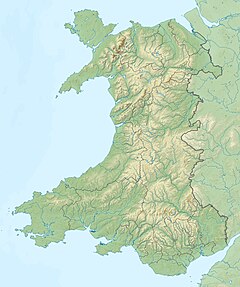Mumbles Lighthouse

The Lighthouse at Mumbles Head
|
|
|
Wales
|
|
| Location |
Mumbles Head Swansea Wales United Kingdom |
|---|---|
| Coordinates | 51°34′01″N 3°58′16″W / 51.566853°N 3.971235°WCoordinates: 51°34′01″N 3°58′16″W / 51.566853°N 3.971235°W |
| Year first constructed | 1794 |
| Automated | 1934 |
| Construction | brick tower |
| Tower shape | two-stages octagonal prism tower with double balcony and lantern |
| Markings / pattern | white tower and lantern |
| Height | 17 metres (56 ft) |
| Focal height | 35 metres (115 ft) |
| Current lens | biformed pair of Tideland Ml300 Beacons |
| Light source | solar power |
| Intensity | 13,700 candela |
| Range | 15 nautical miles (28 km; 17 mi) |
| Characteristic | Fl (4) W 20s. |
| Admiralty number | A5358 |
| NGA number | 5756 |
| ARLHS number | WAL-016 |
| Managing agent |
Trinity House |
Trinity House
Mumbles Lighthouse, completed in 1794, is a lighthouse located in Mumbles, near Swansea. The structure, which sits on the outer of two islands off Mumbles Head, is clearly visible from any point along the five mile sweep of Swansea Bay. Along with the nearby lifeboat station, it is the most photographed landmark in the village.
The tower has two tiers and initially two open coal fire lights were displayed. These open coal fire lights were difficult to maintain and were soon replaced by a single oil powered light within a cast iron lantern.
In 1860, the oil powered light was upgraded to a dioptric light and the fort that surrounds the tower was built by the War Department. In 1905, an occulting mechanism, where the light was made to flash, was fitted. This was partially automated in 1934. By 1977, the cast iron lantern had deteriorated beyond repair and was removed. A different lantern was added in 1987. In 1995, the main light was replaced and an array of solar panels and emergency monitoring equipment were added.
...
Wikipedia

